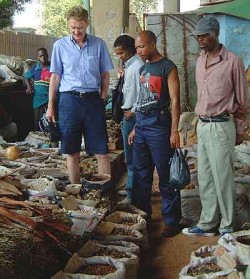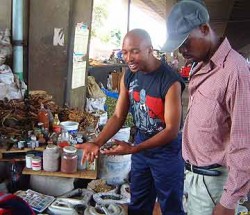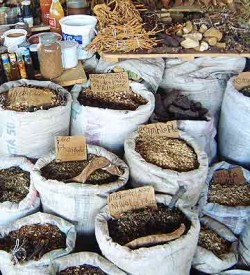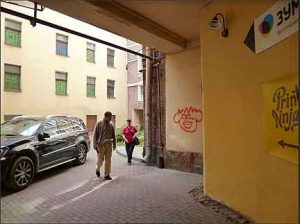
South Africa—It was somewhat of a shock to find nothing but white lines on asphalt in the place we knew we left a van. We couldn’t help but wonder whether our minds were slipping and the van stood undisturbed in a forgotten location. But there it wasn’t, high noon and sixty feet from the entrance of Rustenburg’s busiest supermarket. We stood two and a half hours, groceries dripping and spoiling, staring morosely at our empty parking space as we waited for the South African Police. They never bothered to show up.
So the van was stolen; we shouldn’t have been surprised. We’d read in the local papers how often these vehicles disappear into the taxi trade, and our own experience had provided us with enough warnings. Once we’d returned from an hour in a Johannesburg mall to find the ignition busted by a would-be thief who’d easily entered the vehicle but couldn’t get it started, presumably due to the special electronic safety key system with which the van was equipped. Weeks later in the same parking lot a less-skilled perpetrator was foiled, ruining only the door lock. Then, the week before Christmas, we were jabbed by the foul fingers of crime in a more personal manner.
Winding up a long stay in South Africa, we had packed a few boxes to mail home. The year had seen a natural accumulation of files, notes, photos, and clothing purchased to shield us from a winter for which we were ill-prepared. Though we weren’t sending anything of major value, we were distressed to learn that it wasn’t possible to insure any mail to the U.S. We never completely trust international mail, especially in nations rife with poverty. In addition to sloppy and careless handling, we worry about stamp-stealing, prevalent in many parts of Africa. Postal workers are known to steam stamps off envelopes, discard the letters, and earn pennies for the stamps. But as we couldn’t justify sending everything air cargo, we packed up four twenty-pound boxes of a year’s slough.
In Rustenburg, an hour’s drive from where we lived, we rushed to the post office, as we knew it closed for lunch at one. We parked at the busy entrance, directly in front of the public telephones. I waited in the van with the parcels while Bob went to buy tape for a final touch on the labels. I was engrossed in Newsweek when a sullen man materialized at my open window. He asked where some street or shop was; I couldn’t quite understand, as he spoke in the submissive, barely audible mumble so many South Africans used. I asked him several times to repeat himself—we were always so sensitive about being friendly and courteous to everyone there.

Meanwhile, a second man appeared at the open driver’s side window and asked another unintelligible question. With a stranger on either side of me, open windows, keys dangling in the ignition, I felt frighteningly vulnerable. I casually lowered a hand to my bag and shoved my watch wrist down and out of sight, trying to look at both men at once while politely saying I don’t know, sorry, no. I was definitely nervous.
Both the lost souls wandered innocently away in seemingly separate directions and Bob returned with his purchase. Being an unpredictable land, the post office closed at 12:30, not 1:00 that day, so we missed it after all, and only by two minutes. While we taped labels, I told Bob what had happened, and we discussed how close we’d come to being ripped off.
We locked and left the van, and walked to our usual lunch place two blocks away, grumbling about what a shame it was that we had to suspect people who are most likely decent and honest. We did feel certain we were almost robbed, even though the gentlemen merely asked for directions. Did they appear shady? By our cultural standards, yes. But in South Africa, the downcast eyes, low mumbled speech, and meek stance seem to be the product of generations of oppression and domination, if not their own aboriginal behavior. As we analyzed the origin of the character traits, we felt guilty. Were we prejudiced, or merely wise?

Not wise. We returned forty minutes later to find only one of our four boxes left in the locked-tight van. Yes, in retrospect, leaving the boxes in the unattended van was stupid. We should have known. But in broad daylight, on a crowded street, right in front of a government building—who would think they’d have the nerve? We half-expected to lose a box or two in the mailing, but not before the mailing.
Of course none of the people at the telephones or waiting for the post office to reopen saw anything. Off we went to the police station, where officers assured us we’d never see our things again. Our clothing would be put to good use and our files, photos, and books would most likely fuel an evening’s cooking fire.
We’d had the privilege of using a borrowed van for weekly treks into town from where we lived in the bush. Careful and conscientious, we treated the van as if it were our own; that is, we parked it in the busiest, closest, and best-lit places, and always ensured it was locked securely. Despite this, the statistics were shocking. In 45 weeks we borrowed the van about 40 times, almost once a week. With our four occurrences, we were victimized ten percent of the times we drove. This would translate to 36 times a year, an intolerable figure, if we had driven every day, as we do at home.
We were not virginal victims. In California, our house had been robbed, our car stereo stolen, and an illegal alien once tried to get into my bedroom window while I was home alone. In the latter case, the police arrived swiftly, apprehended the creep and, before my eyes, dispossessed him of a knife, a screwdriver, and a few hundred pornographic pictures. But these three affronts were spread over seven years and, until South Africa, comprised our entire experience as victims of crime.
With the frequency of our South African incidents, it became difficult to give the benefit of the doubt to the average man on the street, the man who wouldn’t meet our gaze and mumbled incoherently into the ground. Of course it could be argued that our logic was flawed, that there was no proof who our thieves were. True. But aren’t we all susceptible to hunches and assumptions that grow from experience? We tend to generalize, to the detriment of many, and judge a whole by its most visible parts. The people who indulge in violence and crime poison our perception of the group.

Bob and I left that country with a unique South African souvenir tucked safely away, an unfortunate byproduct of the chronic crime we experienced there. Not rare but valuable, we took away a useful and lasting kernel of cynicism, planted by thieves. As we continue living the lives of expatriates, and even in our own country, we’re more suspicious of and aloof to everyone who approaches us.
Excerpt from Travel Advisory: How to Avoid Thefts, Cons, and Street Scams
Chapter Three: Getting There—With all your Marbles
For more on alternative souvenirs, listen to the Tiger Lillies’ song in this post.





2 Comments
What are the chances that two white men in a van would know the directions to whereever better than ANY other black person there?
So other than that the visit was great? 😉
‘an illegal alien once tried to get into my bedroom window while I was home alone’
Oh wow.
Great story. As always. Great story.